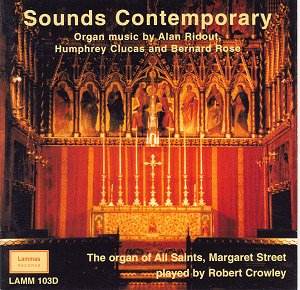The
late Alan Ridout has the lionís share in this collection of British
organ music, quite deservedly so for this prolific and versatile
composer wrote many substantial works for organ. Some of these
were available on disc several years ago, in magnificent performances
by Allan Wicks (on WEALDEN WS 209, published in 1984, nla and
sadly not re-issued in CD format at the time of writing). So,
the present release rather puts the balance straight again. Robert
Crowley has chosen works of quite different character from various
periods of Ridoutís composing career. Indeed, the earliest pieces
recorded here, Two Pictures of Graham Sutherland
(Path in the Wood, Thorn Head) date from 1967. Originally,
Ridout composed a triptych (Thorn Head, Path in the Wood, The
Bow) inspired by some of Sutherlandís paintings. The complete
set was recorded by Allan Wicks for the WEALDEN disc mentioned
above. For some reason, only two movements were published by O.U.P.
(this despite the original three-movement set being magnificent).
These pieces are superbly crafted, as is so much of Ridoutís music,
and clearly demonstrate his mastery and feeling for the organís
possibilities.
The
Passacaglia of 1971 is a deeply serious, intense
piece of music, a "study in crescendo" (the composerís
words) slowly building-up to a shattering conclusion.
All
the other pieces were composed during the last decade of Ridoutís
life and clearly demonstrate the variety of the composerís approach.
Both Suite Bretonne, subtitled Le Tombeau de
Jean-Claude Legat, and based on Breton melodies noted down
after hearing a recital given by Legat, and Scots Suite
are Ė on the whole Ė more straightforward, though they also brilliantly
exploit the instrumentís colouristic possibilities. I do not know
any of Stanley Spencerís painting, so am unable to tell how Christ
Preaching at Cookham Regata relates (or not) to that painting.
This is, however, another brilliant piece, full of invention and
packed with many unexpected touches.
The
Night Watch is by far the longest and most substantial
work here. It is, of course, inspired by Rembrandtís celebrated
painting still to be seen at the Rijksmuseum in Amsterdam. It
is a long, slow, brooding processional building-up to a tense
climax before dying away quietly. Incidentally, one is now sure
that there was originally nothing nocturnal in this huge canvas.
Anyone who has seen it has noticed that the painting has now been
partly cleaned (a small patch in a bottom corner) clearly showing
that the scene actually takes place in daylight. This, however,
has little impact on oneís appreciation of the painting and of
Ridoutís powerful musical response to it.
Humphrey
Clucasís Passacaglia of 1998 was written for the
present player, as were Ridoutís Suite Bretonne,
Scots Suite and The Night Watch as well
as Roseís own Passacaglia also heard here. Besides
the eight-bar Passacaglia theme, Clucas also weaves the Coventry
Carol into the music.
Bernard
Rose was known as a distinguished scholar and one of the leading
choir trainers of his generation. He was President of the Royal
College of Organists from 1974 to 1976, though Ė curiously enough
Ė he only composed the three short pieces recorded here. The Improvisation
"Einífeste Burg" is a perfect encore. Chimes,
based on the chimes of Magdalen College, Oxford, is a brilliant
study in palindrome. Passacaglia started its life
as a short test piece for the FRCO examination which the composer
later expanded considerably. Its ten variations on the theme (again
based on Magdalen Collegeís hour chimes) unfold with increasing
excitement, culminate in a short fugal section and the whole work
ends with a powerfully affirmative conclusion.
In
short, a most welcome release, superbly played by Robert Crowley
and magnificently recorded. By the way, do not be put off by its
collective title, for this is truly contemporary music, but not
of the experimental kind that turns the organ into a noise-producing
engine. Ridoutís admirers will be delighted while others will
find much to enjoy here. Warmly recommended.
Hubert
Culot
